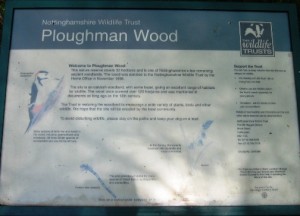THE REMOVAL of non-native species and the reintroduction of coppicing are the main objectives of conservation work currently underway at Ploughman Wood. The Nottinghamshire Wildlife Trust says the work, which should take around eight weeks to complete, will necessitate temporary closures of some sections of the wood.
Ploughman Wood is one of the few remaining areas of ancient woodland in Nottinghamshire and is a valuable habitat for many plant and animal species. Like many woodlands, it also hosts a number of non-native trees including European larch, sycamore, and Corsican pine. The current project involves removing these to allow more space for native species like oak, ash, and hazel, which offer better habitats for native wildlife.
A section of the wood will also be thinned so that a coppicing regime can be reinstated. Coppicing is an ancient woodland management technique that allows more sunlight into the wood and benefits a range of birds, mammals, and invertebrates.
Work should be completed by mid-March, and the Trust asks visitors to pay attention to warning signs, which are there for public safety. Nottinghamshire Wildlife Trust has had support from the Forestry Commission, Biffaward, and the RSPB for this project.

